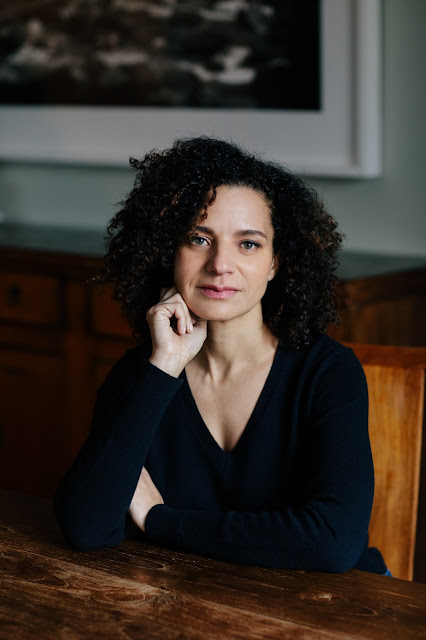 She has held residencies at Millay, Djerassi, and Playa, and is an alum of VONA and Tin House.
She has held residencies at Millay, Djerassi, and Playa, and is an alum of VONA and Tin House.
A Country You Can Leave is Angel-Ajani's first novel.
My Q&A with the author:
How much work does your title do to take readers into the story?Visit Asale Angel-Ajani's website.
I think the title, A Country You Can Leave, does some work to take the reader into the story but not all of it. The title operates at three levels: first, it acts as a container that sort of helps make clear to the reader the confines of living in this desert community. The second thing the title does is reference the fact that Lara’s parents are immigrants, both from countries that have had a long history of citizens being unable to leave easily—Cuba and Russia.
What's in a name?
Names are everything! In the book, names have a lot to do with belonging—Yevgenia, Lara’s mother—names Lara after Boris Pasternak’s Lara from Dr. Zhivago. Saying that Lara Antipova is Dr. Zhivago’s “heartbeat of longing and its death.”
How surprised would your teenage reader self be by your novel?
My teenage reader self would be floored. I don’t think she could ever imagine seeing someone who seemed a lot like her in the pages of any book. If my teenage reader self could have read my book back then, it might have saved her a decade of questionable choices.
Do you find it harder to write beginnings or endings? Which do you change more?
The beginning is always difficult for me. Mostly because I write in a way that is like rooting around a dark room for the tiny key that will open the hidden compartment in the ceiling that holds the box that holds the key to the room with the light switch.So I end up making many passes, back-tracking and restarting until I finally find what I am looking for, which oddly is usually a sound.
Do you see much of yourself in your characters? Do they have any connection to your personality, or are they a world apart?
I see myself in all of my characters, but they are also their own world, which makes them (for me) fun to visit and spend time with. They are relatable to me and yet, I can still be judgmental about the ways they treat each other. So I would say they are like cousins.
What non-literary inspirations have influenced your writing?
Music influences my writing. Which I imagine is common. But being out and about, watching people, seeing how folks interact with each other—that influences me too. Before writing a novel (and now writing another one) I trained as an Anthropologist (yes, graduate school and job and all of that) so it’s there, that ethnographic eye, on culture and how we are shaped by it.
My Book, The Movie: A Country You Can Leave.
The Page 69 Test: A Country You Can Leave.
--Marshal Zeringue